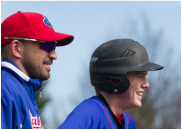During my first years as a head coach I thought that it was important to keep parents at arms length of the baseball operations. First, I thought this was the only way to teach players to be accountable. Second, I was worried that unrealistic expectations around playing time would stem from relationships that I developed with parents and I certainly didn't want playing time decisions to be influenced by how well I got along with a parent.
In reality, the closer a coach is to his/her parent group, the easier it is to create a successful environment. You can help players develop better personal accountability by keeping the message consistent at the diamond and at home. In addition, consistent, clear communication will help to maintain realistic expectations around playing time and on-field opportunities.
See an earlier blog post on effective communication for the pre-season information that I discuss with my families to ensure consistent communication.
Encourage mistakes
So many players are playing this game afraid. They are so afraid of failing that their main objective during the game is to avoiding making a mistake. My main point of emphasis on defense has been to shift our focus to a "make plays" mindset rather than trying to "avoid errors". I`m constantly telling our base runners that if we aren't getting thrown out once in awhile, we are being aggressive enough.
Return on investment for practice time is important
I think back over my first 5 years as a head coach and realize that I spent hours each year practicing the wheel play as part of our bunt defense. One year I stopped putting it into our playbook when it dawned on me that we had never run the play more than one time in a season and were only successful in getting a lead runner once or twice in my entire coaching career. At the level I was coaching, the reality was that the quality of the bunt almost always dictated a defense's ability to throw out a lead runner. I am not saying teams shouldn't use the wheel play, but I am saying that we spent a lot of time working on a defensive play that we rarely used and that provided little value when we did use it (how did it work for the Rangers against the Blue Jays during the 2015 playoffs?).
Time everything
Having some times from game play will help make your practices more realistic. Numbers will obviously vary depending on the level you coach (age of athletes and diamond size), but here are a few examples:
Pitchers - keep them between 1.2 and 1.4 seconds to deliver the baseball when they are working from the stretch in their bullpen sessions. This is time from first movement to the time the ball hits the catchers glove.
Outfielders - challenge outfielders to get to every baseball on the ground in 3.3-3.7 seconds during live BP. If you can stay in this range, 3rd base coaches will send fewer runner to score from 2nd on a single. Time starts when hitter makes contact and time stops when the ball touches the defenders glove.
Infielders - have all infielders make plays to first in 4.0-4.3 seconds. This will give them the ability to throw out most base runners on a ground ball. Time starts when the hitter makes contact with the ball and time stops when the ball is caught by the 1st baseman.
Catchers - the most obvious time to challenge catchers is POP time (time from receiving a pitch to ball getting to middle infielders glove), but I would also encourage coaches to time their catchers as they are working on their bunt footwork. Times for batter-runners on bunts tend to be slightly faster than the numbers above for ground balls and significantly faster for left handed bunters.
Use stations in your practices
This statement is self explanatory, but this concept is certainly not simple. My primary motivation for using stations in practice is to keep players moving and engaged in practice. Remember: if players think practice is boring and they don't come to your practices, you can't help them. The second reason for using stations is to provide an efficient environment for quality repetitions. Not a mass number of mindless repetitions, but quality repetitions.
One of the key components to efficient station work in practice is a daily drill menu for each position. A drill menu is a list of fundamental drills for each position that have already been taught to the players including set up, main focus, and number of reps. Unless you are lucky enough to have a handful of coaches, you want all players to be able to get into their drill work without a coach having to explain and set up each drill. Another key element to station work is enough equipment. Make sure you have enough cones, throw down bases, and baseballs to keep everyone moving. Have a look at our outfield drill menu, or form package, here.
The players you coach might not be the player you were
The world is constantly changing and much has been made about how leaders can best relate to Gen X or Gen Y or the Centennials. The bottom line...the generation that we lead as coaches will be different than our generation. Rather than bemoaning everything that is wrong with the the ìnstant gratification generation that we coach and how short their attention spans are, just realize that your players won't all be like you. And that is OK. I wasted a lot of time and energy early in my coaching career wondering why players weren`t more invested or why their work ethic was so erratic. Eventually I realized that just because a player doesn`t approach the game the way I did when I was in high school, doesn`t mean that it is wrong.
What have you learned since you started coaching...Leave a comment and share your lessons!


 RSS Feed
RSS Feed